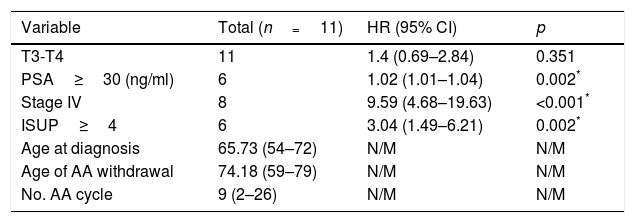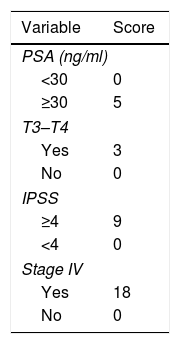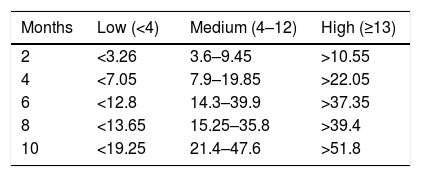Abiraterone withdrawal syndrome (AWS) is characterized by a transient decrease in the PSA after abiraterone acetate (AA) treatment discontinuation in patients diagnosed with metastatic castration-resistant prostate cancer (mCRPC). The aim of our study is to identify the possible predictive factors of AWS at diagnosis.
Materials and methodsWe performed a retrospective study of 70 patients treated with AA at the Institut Català d’Oncologia – L’Hospitalet between 2015 and 2017.
ResultsEleven patients presented AWS. The mean age at diagnosis was 65.73 years and the mean age of presentation was 74.18 years. Patients were in the ninth treatment cycle. The median PSA was: 30.5ng/ml at diagnosis, 33.24ng/ml in the AWS, and 15.78ng/ml before starting another treatment. The median follow-up period after AWS was 8.2 months. The predictive factors of AWS would be: high PSA (p=0.002), ISUP≥4 (p=0.002) and stage IV at diagnosis (p<0.001). Patients with a T stage present high risk, but without statistical significance. An AUC of 0.84 was obtained, with a 95% CI between 0.77 and 0.92 (p<0.001).
ConclusionsThe incidence of AWS is not negligible, describing prolonged responses after AA withdrawal, including the possibility of increased overall survival. These results could entail new treatment schemes for mCRPC.
El síndrome de retirada de abiraterona (SRA) se caracteriza por un descenso transitorio de PSA tras la discontinuación del tratamiento con acetato de abiraterona (AA) en los pacientes diagnosticados de cáncer de próstata resistente a castración metastásico (CPRCm). El objetivo de nuestro estudio es identificar posibles factores predictivos al diagnóstico que puedan influir en el SRA.
Materiales y métodosSe realizó un estudio retrospectivo de los pacientes que recibieron tratamiento con AA en el Institut Català d’Oncologia - L’Hospitalet entre 2015 y 2017, obteniendo una muestra de 70 pacientes.
ResultadosPresentaron SRA 11 pacientes. La edad media al diagnóstico fue 65,73 años y la edad media de presentación 74,18 años. El número de ciclo de tratamiento fue el noveno. La mediana de PSA al diagnóstico fue de 30,5ng/ml; la mediana de PSA en el SRA, 33,24ng/ml; y la mediana de PSA antes de iniciar otro tratamiento, 15,78ng/ml. La media de seguimiento tras SRA fue de 8,2 meses. Los factores predictivos del SRA serían PSA elevado (p=0,002), ISUP≥4 (p=0,002) y estadio IV al diagnóstico (p<0,001). El estadio T presenta un riesgo elevado, pero sin significación estadística. Se obtuvo una ABC ROC de 0,84, con un IC 95% entre 0,77 y 0,92 (p<0,001).
ConclusionesLa incidencia del SRA no es despreciable, describiendo respuestas prolongadas tras la retirada del AA, incluso la posibilidad de una mejoría en la supervivencia global. Estos resultados podrían suponer un cambio en el esquema de tratamiento del CPRCm.











